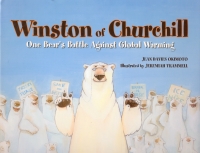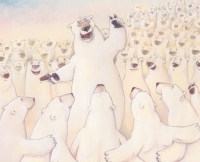| ________________
CM . . .
. Volume XIV Number 9 . . . .December 21, 2007 
 |
Winston of Churchill: One Bear's Battle Against Global Warming.
Jean Davies Okimoto. Illustrated by Jeremiah Trammell.
Seattle, WA: Sasquatch Books (Distributed in Canada by Publishers Group Canada), 2007.
32 pp., hardcover, 2007.
ISBN 978-1-57061-543-6.
Kindergarten-grade 2 / Ages 5-7.
Review by Harriet Zaidman.
** /4
|
| |
|

Climate change is the hot topic in publishing right now, and publishers are burning the midnight oil, turning out books to fill the demand for information.
Invoking the personality of Winston Churchill, the British Prime Minister who rallied his countrymen in the mammoth effort against the Nazis, Jean Davies Okimoto has written Winston of Churchill which is about the battle against global warming and its effects on polar bears. The book is set in the subarctic town of Churchill, MB. The town was named for one of Churchill's ancestors, prompting the historical reference.
Unfortunately, the idea is better than the rendition. The plot rests on Winston's pomposity, but his fall from authority is obvious, as is his recovery.
The success of the book rests with the clever illustrations by Jeremiah Trammell. Young readers will laugh at the humorous pictures of human-looking polar bears sporting picket signs that read: "Freeze Please," "Brrrr is Best," "Ice is Nice," and "Cool It." Trammel uses soft watercolour washes to suggest the background of the northern tundra and sky, and brighter colours for the humans who come from far and wide to ogle at the bears. Winston looks suitably concerned and authoritative, with tiny spectacles on his nose and a fat stogie clamped in his paw, just like the real Winston.
But great illustrations do not make a great story. Head Bear Winston calls his fellow bears together to announce that they must take action to stop the ice from melting. He informs them that he has written a book on global warming and produces copies for everyone. The bears are galvanized into action, but Winston's wife announces that she won't go to the planned demonstration unless Winston gives up his cigar because it adds to global warming. Winston sees the cigar as an extension of his personality, but he gives it up for the cause. The visiting tourists are surprised and educated by the bears' political statements, and supposedly they carry the message home with them.
The plot, to succeed, cannot rest solely the character's personality, especially if that character is based on another person. Winston's growth as a character is not terribly believable because the secondary characters are injected to force a change in the story. The young bear is the voice of wisdom, juxtaposed to William's bluster, but the young bear plays no important role in Winston's transformation.
Winston is also an accomplished writer, but until that moment none of the other bears are aware of their leader's talents. He asks his friends: "Do we want to spend the rest of our lives at the dump?" without having informed the reader in advance that bears do forage in the garbage dumps in Churchill, MB.
 Churchill is built on a natural migration path of polar bears. The town should not be there in the first place. The bears congregate on the edges of Hudson's Bay, waiting for freeze-up, so they can go out and hunt seals. Bears are resourceful animals and hungry in the fall. They eat at the dump while they wait. The problem has been exacerbated in recent years as the water takes longer to freeze.
Churchill is built on a natural migration path of polar bears. The town should not be there in the first place. The bears congregate on the edges of Hudson's Bay, waiting for freeze-up, so they can go out and hunt seals. Bears are resourceful animals and hungry in the fall. They eat at the dump while they wait. The problem has been exacerbated in recent years as the water takes longer to freeze.
Paraphrasing Winston Churchill is cute and may give teachers and parents an opportunity to talk about Winston's namesake.
"We will fight for ice," boomed Winston. "We shall defend our island, whatever the cost may be. We shall fight on the beaches. We shall fight on the landing grounds. We shall fight in the fields and in the streets. We shall fight on the hills. We shall never surrender."
A young bear then points out that Churchill is in the province of Manitoba and is not on an island. Winston is deflated and then trumped again by his wife. He is humbled, but honorable.
That's as far as the humour goes.
Showing what the tourists are eating for breakfast and the line-up for the tundra buggy drags out the story line and adds a few pages but little else.
Teachers who want to discuss the issue of climate change in science and social studies classes may find this book to be of some tangential use.
Recommended with reservations.
Harriet Zaidman is a teacher-librarian in Winnipeg, MB.

To comment
on this title or this review, send mail to cm@umanitoba.ca.
Copyright © the Manitoba Library Association. Reproduction for personal
use is permitted only if this copyright notice is maintained. Any
other reproduction is prohibited without permission.
NEXT REVIEW |
TABLE OF CONTENTS FOR THIS ISSUE
- December 21, 2007.
AUTHORS |
TITLES |
MEDIA REVIEWS |
PROFILES |
BACK ISSUES |
SEARCH |
CMARCHIVE |
HOME |

 Churchill is built on a natural migration path of polar bears. The town should not be there in the first place. The bears congregate on the edges of Hudson's Bay, waiting for freeze-up, so they can go out and hunt seals. Bears are resourceful animals and hungry in the fall. They eat at the dump while they wait. The problem has been exacerbated in recent years as the water takes longer to freeze.
Churchill is built on a natural migration path of polar bears. The town should not be there in the first place. The bears congregate on the edges of Hudson's Bay, waiting for freeze-up, so they can go out and hunt seals. Bears are resourceful animals and hungry in the fall. They eat at the dump while they wait. The problem has been exacerbated in recent years as the water takes longer to freeze.